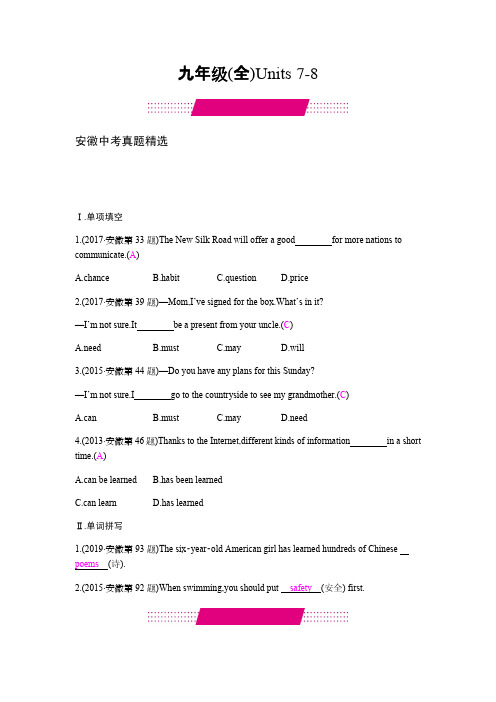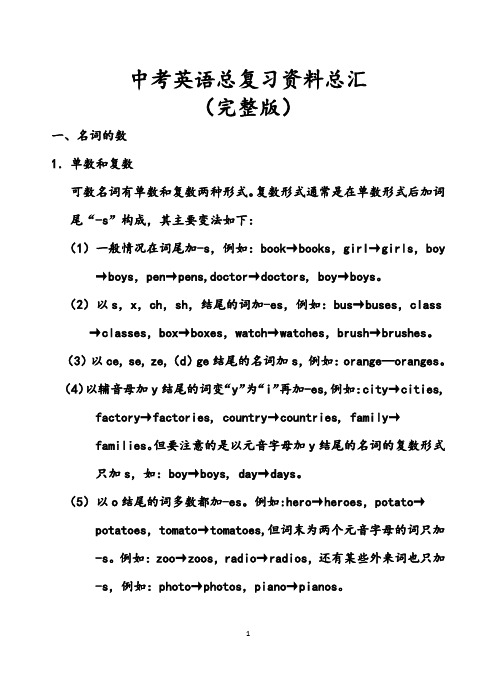九年级英语总复习资料
中考英语总复习九年级(全)Units 7-8 教材知识梳理

九年级(全)Units7-8安徽中考真题精选Ⅰ.单项填空1.(2017·安徽第33题)The New Silk Road will offer a good for more nations to communicate.(A)A.chanceB.habitC.questionD.price2.(2017·安徽第39题)—Mom,I’ve signed for the box.What’s in it?—I’m not sure.It be a present from your uncle.(C)A.needB.mustC.mayD.will3.(2015·安徽第44题)—Do you have any plans for this Sunday?—I’m not sure.I go to the countryside to see my grandmother.(C)A.canB.mustC.mayD.need4.(2013·安徽第46题)Thanks to the Internet,different kinds of information in a short time.(A)A.can be learnedB.has been learnedC.can learnD.has learnedⅡ.单词拼写1.(2019·安徽第93题)The six⁃year⁃old American girl has learned hundreds of Chinese poems (诗).2.(2015·安徽第92题)When swimming,you should put safety (安全) first.熟词生义1.field熟义:n.田野;场地生义:n.领域(1)—In the field of 5G technology,China’s company Huaiwei is the great leader in the world.—Amazing!I’m really proud of our country. 领域 (2)There is a baseball field and two football fields. 场地 (3)In summer,they watched Bird and Squirrel(松鼠) play in the field.(2020·安徽) 田野 2.support熟义:v.& n.支持生义:v.帮助;养活;支撑(1)My host family supported me greatly when I studied abroad. 帮助 (2)In a weightless environment,astronauts don’t need to use their muscles to support themselves,so their muscles start shrinking(萎缩).(2020·广东东莞) 支撑 (3)We will always be there to support whatever you wish to do. v.支持 (4)His mother found it difficult to support the large family.(2017·安徽) 养活 3.circle熟义:n.圆圈v.圈出生义:n.圆;圈子v.盘旋(1)—My uncle has a large circle of good friends in his daily life.—Sounds like he is an active and welcome man. 圈子 (2)This island is almost shaped like a circle.(2020·安徽) 圆 (3)The plane circled the airport before landing. 盘旋 (4)Alice likes circling the important dates on her calendar. 圈出 4.energy熟义:n.力量;精力生义:n.能量;能源(1)Solar panels(太阳能电池板) take energy from the sun and turn it into electricity.(2020·湖南长沙) 能量 (2)He sleeps for only five to six hours a day,but he is still full of energy.(2020·山东聊城) 精力 (3)Renewable energy is the energy that can be used again and again. 能源 5.position熟义:n.位置;地方生义:n.地位;职位;名次(1)As the sun moved across the sky,the position of the shadow changed.(2020·山东德州) 位置 (2)They make China own an important and even top position in the history of human civilization(文明).(2020·湖北黄冈) 地位 (3)We all think Carl is the proper man for the position. 职位 (4)My brother finished the race in second position. 名次 名师考点精讲考点1 get in the way of的用法【教材原句】But sometimes these can get in the way of their schoolwork...有时这些(爱好)会妨碍他们的学业……(P54)get in the way of意为“挡……的路;碍事”。
九年级英语知识点归纳整理

九年级英语知识点归纳整理一、语法知识点。
1. 被动语态。
- 结构:一般现在时的被动语态:am/is/are + 过去分词;一般过去时的被动语态:was/were+过去分词;一般将来时的被动语态:will be+过去分词;含有情态动词的被动语态:情态动词+be +过去分词。
- 用法:当不知道动作的执行者是谁,或者没有必要指出动作的执行者时,使用被动语态。
例如:The bridge was built last year.(不知道谁建的桥,只强调桥被建好了)2. 定语从句。
- 关系代词:that,which,who,whom,whose。
that既可以指人也可以指物;which指物;who指人,在从句中作主语;whom指人,在从句中作宾语;whose表示所属关系,“……的”。
例如:I like the book which/that was written by Lu Xun.(先行词book是物,关系代词可用which或that);The boy who/that is standing there is my brother.(先行词boy是人,关系代词可用who或that作主语)- 关系副词:when,where,why。
when在定语从句中作时间状语;where作地点状语;why作原因状语。
例如:I still remember the day when I first met her.(先行词day表示时间,关系副词用when);This is the place where we used to live.(先行词place表示地点,关系副词用where)3. 宾语从句。
- 语序:宾语从句要用陈述句语序,即“连接词+主语+谓语+其他”。
例如:He asked me where I was going.而不是He asked me where was I going.- 连接词:that(无意义,可省略,在从句中不作成分);if/whether(“是否”,在从句中不作成分);特殊疑问词(如what,when,where,why,how等,在从句中作相应的成分)。
英语人教版九年级全册中考专项复习

年中考英语专习专题一Grammar Revision 名词(Nouns)考点解读:中考对于名词的考查主要侧重以下几点:1.可数名词的复数。
2. 不可数名词的量。
3.名词所有格的用法。
4. 名词的句法作用。
5.词义辨析。
6. 名词与主谓一致。
考查形式主要有:完形填空、完成句子、短文填空等题型。
复习目标:1、知道名词的分类2、掌握可数名词的复数(规则变化和不规则变化)3、掌握不可数名词数量的表达法4、了解名词所有格的用法(双重所有格和名词复数所有格)5、注意名词作主语和定语的用法教学过程:一、名词的分类名词是表示人、事物、地点或抽象概念的名称的词专有名词:表示人、地方、事物、机构、组织等名称的词。
第一个字母一般要大写。
如:Lucy 、Beijing、China、the Great Wall、等。
普通名词:表示一类人或事物、某种物质或抽象概念的名称。
如:book 、tree 等。
普通名词⎩⎪⎨⎪⎧ 可数名词⎩⎨⎧ 个体名词:chair ,book 集体名词:people ,family 不可数名词⎩⎨⎧ 物质名词:rain ,ice ,sunshine 抽象名词:love ,knowledge二、可数名词的复数形式可数名词有单数、复数两种形式。
名词复数构成形式分规则变化和不规则变化:1.名词复数的规则变化(1)一般情况加 -s 1.清辅音后读/s/map-maps book-books2.浊辅音和元音后读 /z/ bag-bags car-cars(2)以s, x,sh, ch 等结尾的词加 -es 读 /iz/bus-buses watch-watches但如果以 –ch 结尾的名词发音为 [k]时,只加 –s 。
stomach — stomachs 读 /s/(3)以辅音字母+y 结尾的词变y 为i 再加es. ies 读 /iz/party-parties baby---babies以元音字母+y 结尾的名词变复数时,直接加-s 变复数:读 /z/monkey---monkeys holiday---holidays(4)以f 或 fe 结尾的名词变复数时,去f 、 fe 加-ves 读 /vz/leaf---leaves wolf---wolveslife---lives thief---thieves但也有例外,如 roof---roofs chief---chiefs以o 结尾的名词,多数加 s 读 /z/。
人教版九年级英语全一册总复习PPT课件

-
1
unit1 u Exercise2 Exercise3 Exercise1 Exercise2 Exercise3 Exercise1 Exercise1 Exercise1
unit2 unit4 unit6
-
Exercise1 Exercise2 Exercise3 Exercise1 Exercise1 Exercise1 Exercise1 Exercise1 Exercise1
C. generous
D. shy
( ) 2. —Do you know who C America, Andy?
2
unit7
unit9 unit11
九年级英语总复习目录
Exercise1
Exercise2
unit8
Exercise3
unit1-7词汇复习1
unit1-7词汇复习2
unit1-7语法练习
unit1-7交际用语练习
Exercise1
Exercise2
unit10
Exercise3
Exercise1
17. 一点一点地
18. 代替;而不是
19. 为……做准备
20. 一次又一次
11. have… in common 12. pay attention to 13. connect… with… 14.
explain sth to sb
15. find out 16. on one’s own 17. bit by bit 18. instead of
19. prepare for… 20. over and over again
-
7
【学以致用】 根据句意及汉语提示,填写适当的短
最全面人教版九年级上册英语各单元知识点总复习归纳总结

最全面人教版九年级上册英语各单元知识点总复习归纳总结Unit 1: Hello!- Greetings and introductions: Learn how to greet people and introduce yourself.- Numbers: Practice numbers and learn how to say and write them.- Personal information: Learn how to ask and answer questions about personal information like name, age, and nationality.Unit 2: How Do You Study for a Test?- Study methods: Learn different ways to study for tests and improve learning efficiency.- Time management: Understand the importance of time management in studying.- Test preparation: Learn strategies for preparing effectively for exams.- Giving advice: Practice giving and receiving study advice using modal verbs.Unit 3: What Are You Doing for Vacation?- Vacation plans: Learn how to talk about your plans for the vacation.- Leisure activities: Discuss different leisure activities and preferences.- Present continuous tense: Understand and use the present continuous tense to talk about present actions.- Future plans: Express future plans and intentions using "be going to" and present continuous tense.Unit 4: I Used to Be Afraid of the Dark.- Past experiences: Learn how to talk about past experiences using "used to" and simple past tense.- Phobias and fears: Discuss different phobias and fears people may have.- Narrative tenses: Understand and use narrative tenses to talk about past events.Unit 5: What is the highest mountain in the world?- Geography and landmarks: Learn about different geographical features and famous landmarks.- Describing places: Practice describing different places using adjectives.- Research skills: Learn how to conduct research and gather information about different topics.Unit 6: Why don't you get her a scarf?- Giving suggestions: Practice suggesting and responding to suggestions.- Gift ideas: Discuss different gift ideas for various occasions.- Buying clothes: Learn how to describe and buy clothes in a store.- Preferences: Express personal preferences and opinions using adjectives.Unit 7: Teenagers should be allowed to choose their own clothes.- Rules and regulations: Discuss rules and regulations for teenagers.- Arguments for and against: Present arguments for and against a given topic.- Writing an opinion article: Learn how to write an opinion article expressing personal views.- Persuasive language: Use persuasive language to convince others of a certain viewpoint.Unit 8: I'll help clean up the city parks.- Volunteering: Discuss different volunteer activities and their benefits.- Environmental issues: Learn about environmental problems and ways to address them.- Expressing willingness: Use "will" and "be willing to" to express willingness to help.- Making suggestions: Practice making suggestions on how to improve the environment.Unit 9: What does he look like?- Physical appearance: Learn vocabulary to describe people's physical appearance.- Personality traits: Discuss different personality traits and their impact on people's lives.- Describing people: Practice describing people using adjectives and sentence structures.- Role plays: Act out different scenarios and describe the characters involved.以上是最全面人教版九年级上册英语各单元知识点的总复习归纳总结。
英语中考总复习 九年级(全) Units 1-2

English when they work or travel abroad.
A. to learn
B. learn
C. learn
D. learns
7. I find____D____ difficult to understand this passage because there are
lots of new words. So I need to look them up before reading.
考点3 Why did Wei Fen find it difficult to learn English?为什么魏 芬发现学习英语是困难的?
【考点抢测】 find+ it+adj.+to do sth.句型(2011.41)
6. People usually find it important and necessary ____A____ spoken
【考点抢测】warn的用法
12. The teacher often warns us against____C____ alone in the river. It's too
dangerous.
A. to swim
B. swim
C. swimming
D. swims
13. To keep children away from danger, we warn parents__D__children
o'clock in the evening.
A. in
B. for
C. of
D. by
【满分点拨】
(1)by + v.ing结构,意为“通过……;以……的方式”。
人教版九年级英语(全册)重点语法知识点复习梳理

人教版九年级英语(全册)重点语法知识点复习梳理人教版九年级英语重点语法知识点复习梳理一.介词by的用法(Unit-1重点语法)1.意为“在……旁”,“靠近”。
Some are singing and dancing under a big tree. Some are drawing by the lake.有的在大树下唱歌跳舞。
有的在湖边画画儿。
2.意为“不迟于”,“到……时为止”。
Your son will be all right by supper time.你的儿子在晚饭前会好的。
How many English songs had you learned by the end of last term?到上个学期末你们已经学了多少首英语歌曲?3.表示方法、手段,可译作“靠”、“用”、“凭借”、“通过”、“乘坐”等。
The monkey was hanging from the tree by his tail and laughing.猴子用尾巴吊在树上哈哈大笑。
The boy’s father was so thankful that he taug ht Edison how to send messages byrailway telegraph.孩子的父亲是那末的感谢,因而他教爱迪生怎样经由过程铁路电报来转达息。
4.透露表现“逐个”,“逐批”的意思。
One by one they went past the table in the dark.他们一个一个得在黑暗中颠末这张桌子。
5.表示“根据”,“按照”的意思。
What time is it by your watch?你的表几点了?6.和take , hold等动词连用,说明接触身体的某一部分。
I took him by the hand.我拉住了他的手。
7.用于被动句中,表示行为主体,常译作“被”、“由”等。
English is spoken by many people.英语被许多人说。
最新中考英语总复习资料总汇(完整版)

中考英语总复习资料总汇(完整版)一、名词的数1.单数和复数可数名词有单数和复数两种形式。
复数形式通常是在单数形式后加词尾“-s”构成,其主要变法如下:(1)一般情况在词尾加-s,例如:book→books,girl→girls,boy →boys,pen→pens,doctor→doctors, boy→boys。
(2)以s,x,ch,sh,结尾的词加-es,例如:bus→buses,class →classes,box→boxes,watch→watches,brush→brushes。
(3)以ce, se, ze,(d)ge结尾的名词加s,例如:orange—oranges。
(4)以辅音母加y结尾的词变“y”为“i”再加-es,例如:city→cities, factory→factories, country→countries, family→families。
但要注意的是以元音字母加y结尾的名词的复数形式只加s,如:boy→boys, day→days。
(5)以o结尾的词多数都加-es。
例如:hero→heroes,potato→potatoes,tomato→tomatoes,但词末为两个元音字母的词只加-s。
例如:zoo→zoos,radio→radios,还有某些外来词也只加-s,例如:photo→photos,piano→pianos。
(6)以f或fe结尾的词,多数变f为v再加-es,例如:knife→knives,leaf→leaves, half→halves。
复数词尾s(或es)的读音方法如下表所示。
复数词尾s(或es)的读音方法(7)少数名词有不规则的复数形式,例如:man→men,woman→women,tooth→teeth,foot→feet,child→children,mouse→mice。
【注意】与man和woman构成的合成词,其复数形式也是-men和-women。
- 1、下载文档前请自行甄别文档内容的完整性,平台不提供额外的编辑、内容补充、找答案等附加服务。
- 2、"仅部分预览"的文档,不可在线预览部分如存在完整性等问题,可反馈申请退款(可完整预览的文档不适用该条件!)。
- 3、如文档侵犯您的权益,请联系客服反馈,我们会尽快为您处理(人工客服工作时间:9:00-18:30)。
九年级英语总复习资料一、被动语态:1.总述:英语中有两种语态:主动语态和被动语态。
1)主动语态表示主语是动作的执行者。
巧记为:主动、主动、主语去动。
例如:Many people speak English.谓语speak的动作是由主语many people来执行的。
2)被动语态表示主语是动作的承受者。
巧记为:被动、被动、主语被动。
例如:English is spoken by many people.主语English是动词speak的承受者。
2.被动语态的构成被动语态由“助动词be+动词的过去分词”构成。
人称、数和时态的变化是通过be的变化表现出来的。
现以teach为例说明被动语态的各种时态的构成。
①一般现在时之被动语态的动词形态:am/is/are+taught 现在被教②一般过去时之被动语态的动词形态:was/were+taught 过去被教③一般将来时之被动语态的动词形态:will/shall be+taught 将来被教歌诀:被动语态be动词,体现时态是关键;过去分词跟后面,被动语态才完全。
3.被动语态的用法(1)不知道或没有必要说明动作的执行者是谁。
例如:Some computers were stolen last night.昨晚,一些电脑被盗了。
(不知道是谁偷的)The window was broken yesterday.昨天,窗户被打破了。
(不知道是谁打破的)This book was published in 1981.这本书出版于1981年。
(没必要说出执行者)(2)强调动作的承受者,而不强调动作的执行者。
例如:This book was written by him.这本书是他写的。
Eight hours a day for sleep must be guaranteed.应用歌诀:谁做动作不知道,说出谁做没必要;动作受者要强调,被动语态运用到。
4.主动语态变被动语态的方法:(1)主动语态的宾语变为被动语态的主语,是代词时,改宾格为主格。
*(2)把谓语变成被动结构(be+过去分词)(根据被动语态句子里的主语的人称和数,以及原来主动语态句子中动词的时态来决定be的形式)。
(3)把主动语态中的主语放在介词by之后作宾语,是代词时,改主格为宾格。
例如:All the people laughed at him.=He was laughed at by all the people.They make the bikes in the factory.=The bikes are made by them in the factory.歌诀:宾变主语主变宾,by宾短语随后跟。
关键谓语动词动,be和“过分”来使用。
5.含有情态动词的被动语态含有情态动词的主动句变成被动句时,由“情态动词+be+过去分词”构成。
歌诀:情态动词变被动,要牢记住三部分,情态加be加“过分”。
例如:We can repair this watch in two days.= This watch can be repaired by us in two days.You ought to take it away.=It ought to be taken away by you.They should do it at once.= It should be done by them at once.二、动名词简述:形式为V-ing,是具有动词性质的名词。
如:I like swimming.与不定式一样,除了不用作谓语动词,可以充当主语、宾语、表语、定语等。
1、动名词的用法1)作主语:Swimming is good exercise.2)作宾语:He enjoys fishing.3)作表语:Teaching is learning. (教学相长。
)注意:当动名词作主语和表语时,一般是可以和动词不定式互换的。
Swimming is good exercise.=To swim is good exercise. Teaching is learning. =To teach is to learn.要强调的是当动名词和动词不定式用作主语时,谓语动词只能用单数形式。
如:Reading books widens our eyes.(阅读开阔了我们的眼界。
)To tell a lie is wrong.(说谎是错误的。
)2、区分“动名词”和“现在分词”He likes walking.(动名词)My habit is walking after dinner.(动名词)He is walking.(现在分词)*原则:当碰到Be+V-ing结构时,能换位的为动名词,不能的为现在分词。
如:Walking after dinner is my habit.的表达也是对的。
而上句则不能表达,所以是现在分词。
3、学习中应当注意的几个问题①初中常见的只能接动名词为宾语的动词。
avoid(避免) mind(介意) finish(完成) miss(错过)consider(考虑) enjoy(享受)如:I must avoid doing such a thing.I finished reading the book.We are considering taking a trip to Europe.②虽然是同一动词,但后接的动名词与不定式的意思有很大差别的动词有五个stop,regret,try,forget andremember。
口诀:动名表前不定后,停止后悔图记忆。
stop(停止)后跟动名词,表示“停止做某事”;跟to+动词原形,表示“停止正在做的事,而去做别的事”。
如:Stop smoking, please. 请不要吸烟。
We are tired. Let's stop to have a rest.我们累了,让我们停下来休息一下。
forget(忘记)后面跟动名词,表示“忘记做过某事(以前做过)”;跟to+动词原形,表示“忘记去做某事(以后要去)”。
如:I forget doing homework this morning.我忘记今天早上做过作业了。
I forget to do homework this morning.我忘记今天早上做作业了。
remember(记住)后跟动名词,表示“记得以前做过某事”;跟to+动词原形,表示“记得以后要去做某事”。
如:I remember posting the letter today.我记得今天把信寄走了。
Please remember to post the letter today.请记住今天要把信寄走。
③同一动词后的不定式和动名词可以互换的动词。
like/love (喜欢、爱)hate/dislike (恨、不喜欢)begin/start (开始)continue (继续)如:It began raining/to rain.He likes studying/to study with us.We continued looking/to look for the missing boy.①而like还常用于would like to do something句型,表示“某人想要、愿意干某事”。
如:I would like to have some chips. 我想要吃些薯条。
②begin如果本身是进行时态,其后面只能接不定式。
如:It's beginning to rain. (T)It's beginning raining. (F)三、现在分词和过去分词简述:英语中的分词分两种:现在分词和过去分词。
⒈现在分词表示动作是主动的和正在进行的。
The boiling water is hot.(开水很烫。
)[正在烧的水]She has a smiling face.(她有一张微笑的面孔。
)过去分词的动作是被动的和完成的(例④-⑥):You can use the boiled water to make tea.(你能用开水来泡茶。
)[沸过了的水,在瓶中]Where is my lost key?(我丢失了的钥匙在哪里?)⒉在语义上,现在分词有“令人……”的含义;过去分词则有“感到……”的意思:This is an interesting movie.I’m interested in this movie.⒊在作宾语补足语时,如果宾语与有关分词有“发出动作”的关系,就用现在分词。
如:Don't keep the visitor waiting.(别让客人一直在等。
)如果宾语和有关分词有“承受”关系,那么这个分词就要是过去分词了。
如:Where did you get your book printed?(你去哪里打印你的书?)四、宾语从句:由疑问词引导的宾语从句。
引导宾语从句的疑问词分为两类:疑问代词(what、whom、who、whose、which)疑问副词(when、where、why、how)。
语序:无论主句是陈述句还是疑问句,宾语从句一律用陈述语序, 即“引导词+主语+谓语+其他”。
如:1.Could you tell me where Wei Fang lives ?2.Please tell me what your name is .时态 1. 如果主句是一般现在时或一般将来时, 宾语从句的时态可根据实际表达的需要来确定。
如:1). Jenny knows the man a kite at thattime.(fly)2). I know that he computers well. 我知道他电脑玩得很熟。
2. 如果主句是一般过去时, 宾语从句用过去时态的某种形式。
如:1). Jenny knew the man a kite at thattime.(fly)2). I knew that he computers well. 我知道他电脑玩得很熟。
3. 若宾语从句叙述的是客观事实、自然现象或科学真理等,从句不受主句时态的限制,用一般现在时。
如:1).He said time money.(be)2).He told the girl that leaves green in autumn.(turn)3). When he was still a boy, he knew that the eartharound the sun. (move)五、(问路和指路)1. 问路时应首先说一声:“Excuse me.”(打扰了)2.问完路后,千万不要忘记向对方说句“Thank you forhelping me.”或“Thank you.”3.问路时经常用到“向左(右)拐”这样的表达,英语对此有两种说法,即turn left (right)或turn to the left(right)。
